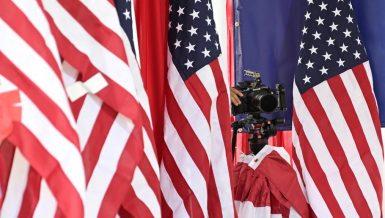
The Quiet War Against Press Freedom In The US From Bush To Biden

The Quiet War Against Press Freedom in the US from Bush to Biden
“Over the past century in the United States, Trump stands out for his aggressive and sustained efforts to undermine the free press,” Sulzberger wrote.“I hope our nation, with protections for a free press explicitly enshrined in the First Amendment, will maintain its distinctively open path, regardless of the outcome of this election or any other.”
This article outlines the numerous risks that could affect the independence and integrity of journalism in the United States, especially in the context of Trump's ongoing rhetoric and possible policies if he were to win another term, taking into account the constraints faced by the American press during his prior administration. This raises the question of whether true freedom and professionalism are present in American journalism, or if it is simply a narrative anticipated to be accepted uncritically by the global audience.
At the beginning, it is essential to acknowledge that, in general, the United States remains at the forefront of major nations where freedom of expression is guaranteed by the Constitution. Media outlets can be accessed anytime, allowing individuals to read thousands of reports critical of the US administration without journalists fearing for their safety, security, or the possibility of legal repercussions.
Furthermore, it is undeniable that American journalism has enjoyed a unique period of press and media freedom for nearly three centuries. Americans take pride in the fact that the media played a pivotal role in the downfall of former President Richard Nixon during the Watergate scandal. On 18 June 1972, The Washington Post published an article detailing espionage activities conducted by members of Nixon's Republican Party against the rival Democratic Party, which ultimately led to Nixon's resignation in 1974.
Nevertheless, it can be argued that the professionalism and freedom of the American press and media began to erode starting in 2001, especially when the White House began to leverage media outlets to shape public sentiment in support of the United States' war on terrorism and various military engagements.
These actions were often framed as efforts to combat terrorism and oppressive regimes, particularly in Arab and Islamic countries, as evidenced by interventions in Iraq, Libya, Syria, and Afghanistan.
This event signified the beginning of a significant transformation in American media, transitioning from a prominent advocate for global freedom of expression and press to a vehicle for the most advanced and deceptive techniques of suppressing, distorting, and obscuring information from the public. This change is designed to achieve enduring political aims that reach far beyond American public sentiment, influencing the entire world. Such actions are rationalised under the guise of mobilising American resources in the battle against terrorism and dismantling the“axis of evil” perceived as a threat to the United States and the West, while simultaneously shaping American public opinion to endorse these objectives.
Numerous Americans, including politicians, authors, and journalists, have validated these claims. Such confirmations are documented in a publication titled“Into the Buzzsaw: Leading Journalists Expose the Myth of a Free Press.” This collection includes personal essays from distinguished reporters who recount their encounters with censorship.“Buzzsaw” has been honoured with the National Press Club's Arthur Rowse Award for Press Criticism and the Independent Publishers Award, and it is available for online access. Released in 2002, the book features a foreword by the renowned intellectual and author Gore Vidal, recognized for his critiques of US foreign policy during that period.
This book presents a collection of insights from some of the most prominent American journalists, detailing their experiences behind the scenes in newspapers and television networks over many years of journalistic work. These accounts are capable of evoking astonishment, bordering on shock, as they reveal the context in which American media operated while covering events following 11 September. The press became mired in a quagmire of falsehoods and half-truths, which were utilised to serve the political agenda set forth by officials in the White House.
The American media coverage of the Russian-Ukrainian war during Biden's administration serves as further evidence that the erosion of press and media freedom in the United States is not limited to Trump's policies. Various radio and television channels, along with all Russian communication means, have been severed within American territory, resulting in American citizens and all residents in the US being subjected to a singular media narrative in a country that once revered pluralism and freedom of expression.
The media coverage of pro-Palestinian demonstrations within the United States also serves as a clear example of the undermining of press freedom in the country. Since the beginning of 2024, law enforcement authorities have arrested 14 journalists, while 16 others have faced harassment, with the majority of these incidents occurring during the coverage of pro-Palestinian protests at American universities. This information is sourced from the US Press Freedom Tracker, which provides a database of press freedom violations in America.
The oppressive practices against press freedom have resulted in the United States being ranked 55th among countries in the 2024 World Press Freedom Index. This ranking has prompted leaders of the National Press Club in the United States to issue a statement expressing their concern regarding the decline in local press freedoms. The statement was released by Emily Wilkins, President of the National Press Club, and Jill Klein, President of the National Press Institute, in May.
How does Trump play a role in this scenario? Trump's confrontations with the media are merely a single chapter in a larger narrative about the fight for press freedom. The undeniable reality is that conversations about the integrity and liberty of journalism frequently take a backseat to the political, economic, and strategic matters that influence what is labelled as America's national security, along with the broader security concerns of the West, particularly regarding its close ally, Israel.
Dr Marwa El- Shinawy – Academic and Writer

Legal Disclaimer:
MENAFN provides the information “as is” without warranty of any kind. We do not accept any responsibility or liability for the accuracy, content, images, videos, licenses, completeness, legality, or reliability of the information contained in this article. If you have any complaints or copyright issues related to this article, kindly contact the provider above.






















Comments
No comment